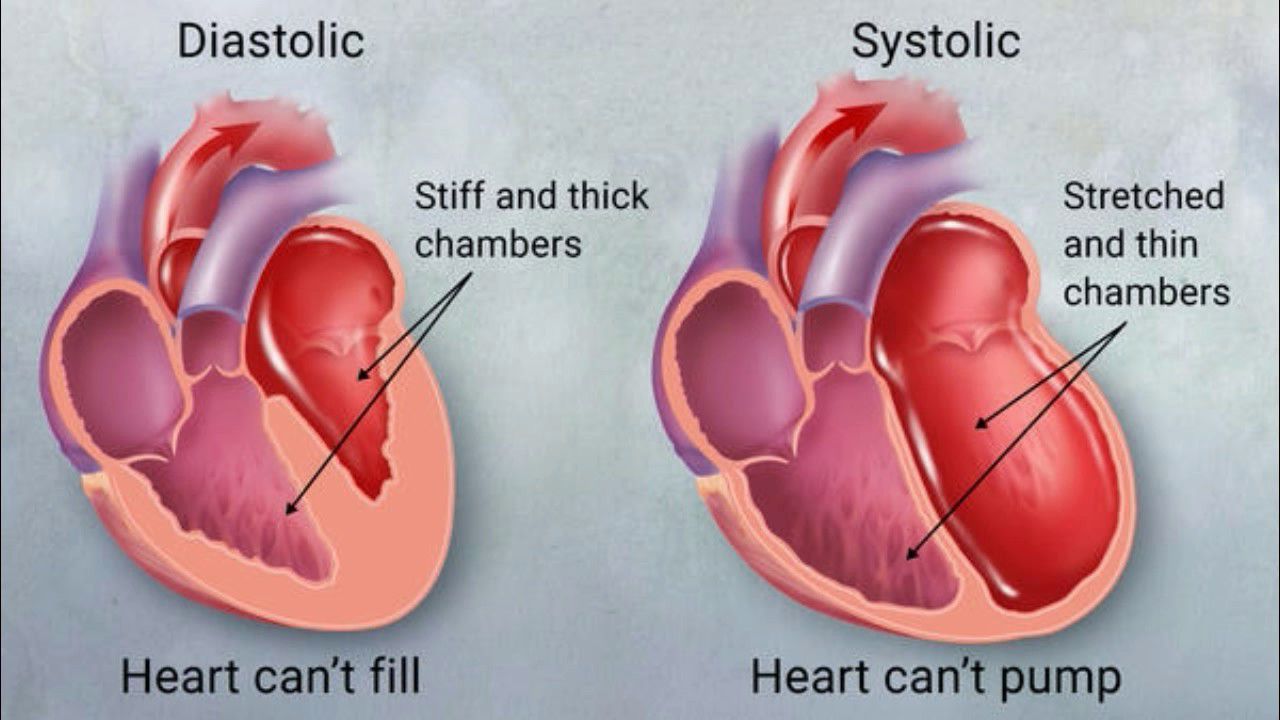Congestive Heart Failure (CHF), is a medical condition that disturbs the pumping function of the human heart. Heart muscle which has turned weak or inflexible is not able to properly fill up the heart compartments with blood and squeeze it out once again. This leads to decreased movement of oxygen rich blood from the cardiovascular system to the tissues of the body. Mainly because the heart is not able to pump properly, extra fluids might build up in the lungs, legs and abdomen. Excess fluid in the lungs is precisely what causes breathing difficulties with heart malfunction.

Topics Covered
Congestive Heart Failure Symptoms include
- Breathing difficulties when active or while lying down
- fatigue and body weakness
- swelling in your legs, ankles and lower legs
- rapid or uneven heartbeat
- reduced ability to work out
- persistent cough or wheezing
- bloating of your belly
- sudden weight gain from fluid retention.
Congestive Heart Failure Causes include
- Damage to the cardiovascular system from accelerating clogging of the arteries (atherosclerosis)
- heart attack
- high blood pressure levels
- genetic defects such as faulty heart valves
- chronic diseases such as diabetic issues and lupus
- thyroid dysfunctions
- obesity, lack of exercise
- infections or viruses
- abusive drinking
- drug use and chronic abnormal heart rhythms.
Nutrition Tips for Congestive Heart Failure
If you have congestive heart failure, follow these nutrition guidelines:
- Check food labels, and bound salt and sodium to 1,500 to 2,000 milligrams per day.
- Substitute salt and other high-sodium seasonings with replacements that have no salt or are low in sodium.
- While dining out, think about unrevealed sources of salt and sodium, such as salad dressings and soups. Ask for options low in salt and sodium.
- Select meats and other foods that are low in saturated fat to help in lowering your cholesterol levels.
- Avoiding alcohol is must. If your heart failure is caused by alcohol, it’s especially important that you don’t drink any alcoholic beverages.
Diet for Congestive Heart Failure Patients
To improve the patient’s health, the doctor recommends certain dietary changes that need to be followed lifelong.
Water:
Drink enough water is what everyone says to stay healthy and fit. Many people recommend drinking 8 glasses of water daily. However, this tip for health is not applicable to Congestive Heart Failure patients in the elderly. The reason is simple; Water retention is common among Congestive Heart Failure sufferers, which many times causes swelling of arms and legs. So, it is obvious that the patient must keep a check on water intake to prevent the body from retaining fluids and swelling.
Saturated Fats:
Foods which has high fats such as processed meat, fried foods, chicken with skin, egg yolk, pastries, ice creams and cakes can damage your arteries and can cause you Congestive Heart Failure.
Alcohol:
It can be asserted that moderate alcohol consumption resembles a healthy heart. Once again, this statement doesn’t hold accurate for people detected to have Congestive Heart Failure. In fact, drinking alcohol is likely to cause much more damage to the heart muscles. Thus, be it the wine, whisky or beer, an individual must refrain from consuming these alcoholic beverages.
Salt:
Even though, salt (sodium) greatly enhances the taste of food, besides it promotes water retention. An excessive amount of salt can lead to gathering of fluids in the abdomen, legs and the lungs, eventually causing difficulty in breathing. So, minimizing salt consumption is very important to prevent any inconveniences. Apart from adding less salt while cooking food, you need to stay away from foods loaded with sodium. Processed food such as salty chips must be eliminated. Although vegetables, soups and meat filled in cans are free of preservatives, they are high in salts. So, instead of going for canned food stuff, choose fresh vegetables and fruit (salad) to reduce salt consumption. Almost all tomato ketchup and sauce, in the market come with salt, so people today with Congestive Heart Failure must avoid eating these food items. Junk foods such as hot dogs, smoked meat, hamburgers and pizzas should be avoided as they contain too much salt.
How to Lower Salt Intake
Avoid adding salt to the cooking recipes and opt for natural salt replacements like lime juice to enrich taste. The gravy matter, especially in restaurant dishes is high in salt and bad cholesterol. Therefore, order foods which contains minimal amount of gravies. Also, when preparing food at home, avoid making gravies. Each packed food comes along with a content label that specifies its content per serving. If the food label signifies that the sodium content is less than 140 mg, then only buy that item.
Fiber:
By raising the fiber content in your diet you can regulate your cholesterol levels and discard unnecessary waste from your body, which is highly recommended.
Avoid Processed Foods:
Magnesium is truly one of the necessary vitamins and minerals for avoiding congestive heart failure. Individuals who consume commercially-processed foods face a higher risk of susceptible to heart failure, as an example food items that lack magnesium. Consequently, taking processed food should be avoided, to ensure that your body will not likely face inadequate magnesium.
Include Potassium:
It is necessary to increase the intake potassium in your diet as it regulates blood pressure levels, which enhances the health of your heart. Foods rich in potassium are bananas, peaches, potatoes, apricots.
Include Unsaturated Fats:
unsaturated fats are healthy for the heart and they must be included in the diet, also these foods help in lowering down the cholesterol level, thus they improve your health. Vegetable oil, nuts fish are the rich sources of unsaturated fats.
Congestive Heart Failure Diet Guidelines
The objective of diet for congestive heart failure is to decrease the work load of your heart, decrease fluid buildup and make it simpler for you to breath. The diet for congestive heart failure limits your intake of sodium to 2000 to 3000 mg a day and motivates you to choose a lot more fresh, unprocessed foods that are naturally lower in sodium. Some people with congestive heart failure should limit their fluid intake. Speak with your doctor regarding your daily fluid needs.
Breakfast:
A low-sodium breakfast dish may include one cup of cooked oatmeal topped with 1/4 cup of raisins and 1/2 cup of non-fat milk dished up with a hard-boiled egg and 1/2 glass of orange juice. This morning meal consists of 465 calories and 125 mg of sodium. If you attempt to decrease the sodium in your daily diet, the initial step is to stop adding salt while cooking and eating at the table. One teaspoon of salt has 2200 mg of sodium.
Lunch:
A low-sodium lunch meal for congestive heart failure may include three oz. of low-sodium tuna combined with 1 tbsp. of low-fat mayonnaise on two slices of whole wheat bread, loaded with 1 cup of mixed green vegetables topped with 1 tsp. of olive oil and balsamic vinegar, one cup of non-fat fruits yogurt and a small orange. This meal contains 620 calories and 700 mg of sodium. You may also help limit your sodium intake by preparing foods at home. In this way, you know exactly how much sodium you are eating.
Dinner:
A low-sodium dinner meal may include 3 oz. of baked chicken breast seasoned with fresh rosemary and served with 1 cup of rosemary roasted new potatoes drizzled with 1 tsp. of extra virgin olive oil, 1 cup of roasted carrots with 1 tsp. of olive oil, and one cup of non-fat milk. This course dinner meal has 580 calories and 360 mg of sodium. Eliminating salt from your daily diet will take time for your taste buds to get accustomed to. Make use of spices and herbs to add flavors to your meal without the salt. Nutritious salt-free seasonings include garlic, pepper, rosemary, basil, oregano, lemon and vinegar.
Snacks:
You may snack on your diet for congestive heart failure. Read food ingredient list of some of your most liked snack items to provide help to limit your sodium consumption. A healthy and low-fat meal may include a medium apple with 1/4 cup of unsalted almonds, which includes 230 calories and 15 mg of sodium.
Related Other Posts:
- Common Foods that Causes Constipation
- 7 Common Food Poisoning Symptoms & Signs
- 16 Early Kwashiorkor Symptoms and Causes
- Thyromegaly: Do Not Ignore that Lump on your Throat
- Polyarthralgia Symptoms, Causes, Diagnosis, Treatment
- 13 Common Symptoms of Bronchitis
- Pancoast Tumor: Symptoms, Causes, Diagnosis, Treatment




